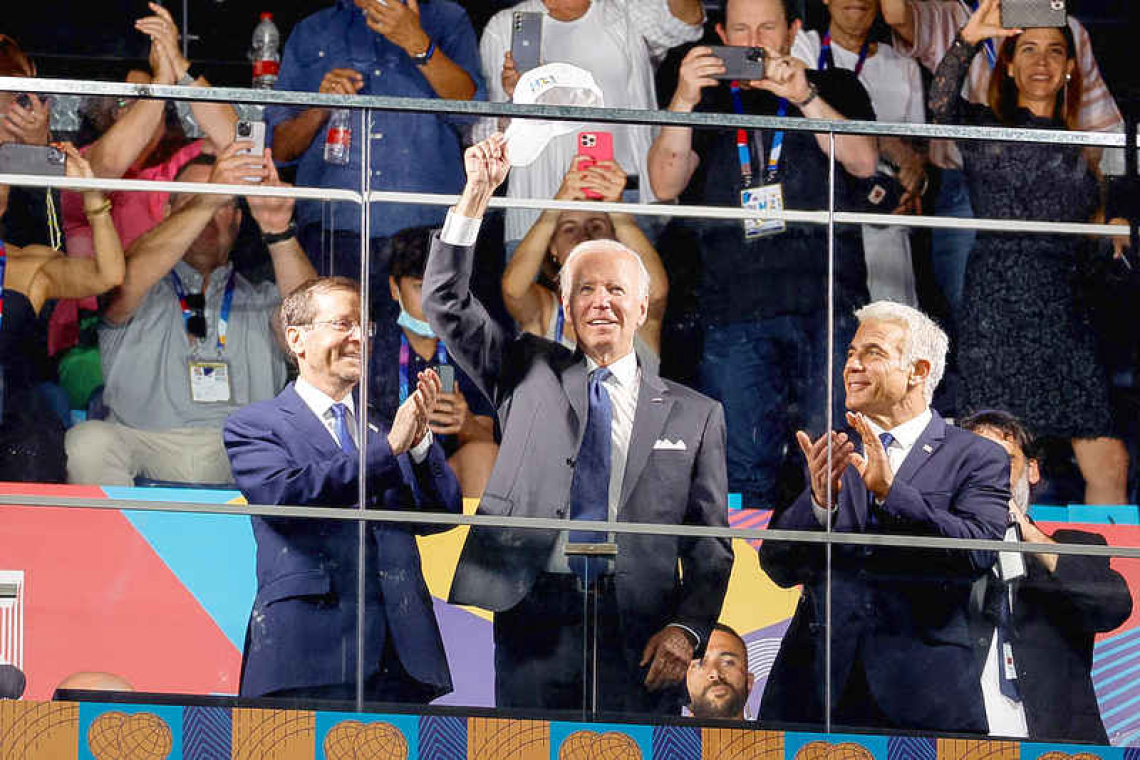JERUSALEM--U.S. President Joe Biden and Israeli Prime Minister Yair Lapid signed a joint pledge on Thursday to deny Iran nuclear arms, a show of unity by allies long divided over diplomacy with Tehran.
The undertaking, part of a "Jerusalem Declaration" crowning Biden's first visit to Israel as president, came a day after he told a local TV station that he was open to "last resort" use of force against Iran - an apparent move toward accommodating Israel's calls for a "credible military threat" by world powers.
"We will not allow Iran to acquire a nuclear weapon," Biden told a news conference following the signing of the declaration.
Washington and Israel have separately made veiled statements about possible preemptive war with Iran - which denies seeking nuclear arms - for years. Whether they have the capabilities or will to deliver on this has been subject to debate, however.
Thursday's statement reaffirmed U.S. support for Israel's regional military edge and ability "to defend itself by itself". Widely believed to have the Middle East’s only nuclear arms, Israel sees Iran as an existential threat.
"The United States stresses that integral to this pledge is the commitment never to allow Iran to acquire a nuclear weapon, and that it is prepared to use all elements of its national power to ensure that outcome," the statement added.
Lapid cast this posture as a way of averting open conflict. "The only way to stop a nuclear Iran is if Iran knows the free world will use force," he said after the signing ceremony.
Speaking alongside him, Biden described preventing a nuclear Iran as "a vital security interest for Israel and the United States and, I would add, for the rest of the world as well."
Biden, who also met former Prime Minister Benjamin Netanyahu, received Israel's Presidential Medal of Honor from Israeli President Isaac Herzog and reiterated America's "iron-clad commitment" to Israel's security. There was no immediate comment from Tehran.
In 2015, Iran signed an international deal capping its nuclear projects with bomb-making potential. In 2018, then-U.S. President Donald Trump quit the pact, deeming it insufficient, a withdrawal welcomed by Israel.
Iran has since ramped up some nuclear activities, putting a ticking clock on world powers' bid to return to a deal in Vienna talks. Israel now says it would support a new deal with tougher provisions. Iran has balked at submitting to further curbs.
Biden has pushed for a return to talks but said it was up to Iran to respond. "We are not going to wait forever," he said.
Beyond enhancing the allies' sense of deterrence and mutual commitment, Thursday's power-projection may also offer Biden a boost when he continues on to Saudi Arabia on Friday. Riyadh has its own Iran worries, and Biden hopes to parlay that into a Saudi-Israeli rapprochement under U.S. auspices.
Biden said he and Lapid had discussed how important it was "for Israel to be totally integrated into the region". Lapid, in turn, deemed Biden's Saudi trip "extremely important to Israel".
Hamas, an Islamist group that has helped spearhead the Palestinian struggle against Israel, decried the moves. Hamas leader Ismail Haniyeh issued a statement calling for the formation of "a political alliance to protect the region from domination, normalization and the seizure of its wealth."
Some Israeli as well as Gulf Arab officials believe the nuclear deal's sanctions relief would provide Iran with far more money to support proxy forces in Lebanon, Syria, Yemen and Iraq. They are also skeptical about whether the Biden administration will do much to counter Iran's regional activities.
A U.S. official, asked if Thursday's declaration was about buying some time with Israel as Washington pursues negotiations with Iran, said: "If Iran wants to sign the deal that has been negotiated in Vienna, we have made very clear we're prepared to do that. And, at the same time, if they're not, we will continue to increase our sanctions pressure, we will continue to increase Iran's diplomatic isolation."
The Jerusalem Declaration further committed the United States and Israel to cooperating on defence projects such as laser interceptors, as well as mixed-use technologies, including artificial intelligence and quantum technology. "We work together as one team, not only in missile defence, we have many different ways of defence cooperation with the U.S," said Daniel Gold, head of the Directorate of Defense Research and Development in the Israel Ministry of Defense.
The United States was open to future defence grants to Israel, the statement said.







